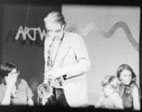Robert E. Fulton
"Bob Fulton was a teacher of mine in Chicago at the Chicago Art Institute and the first me him around 1975, During my many years as a film student I can only count two teachers who had a profound affect upon me and Bob was one of them.
"I guess one would call Bob a spiritual film teacher....he never taught me stuff like f stops, or how to splice...instead he showed me how to "see", and how to release thought into the shot without attachment to either the thought or the shot. Bob also taught me the importance of what he would say is creating that one good frame, and if you could can capture one good frame, then you can create thousands and before you know it you have a created a film. These lessons I now impart to my film students.
"I remember the first day I walked into the SAIC class that Bob was teaching. He was smiling with a huge grin and had just finished watching a student's 100 feet of 16mm black and white camera roll. He had found several frames or series of frames that excited him and he would talk about it for a great length and encouraged the student to shoot another roll of film exploring those visual items that were discovered on the first roll. Bob suggested that the student shoot a roll of film a week, and when the student said he could not afford to this, Bob gave him a 100 feet of film, and said he would give the student a roll of week on the condition that he film with it and brought it class each session.
"Bob continued the class like this for about 6-7 hours without taking a break, and after class would invite us all out for salads and drinks at his expense...and talk philosophy with most of us....
"The other thing that was amazing about Bob was the language that he used. He would talk carefully choosing each word, like an important film frame, and each word seemed to be dense with meaning like his movies. It was almost as if his everyday speech was a film poem of sorts........that made me re think my own concepts of perception art and life.
"I had never experienced a class such as that and continued to go each week. Some of my colleagues at that time included Allan Ross (founder of Chicago Filmmakers) and Barbara Kossy (photographer). Eventually me and Bob became close and I invited him to San Francisco to judge a film festival and be a guest artist at the San Francisco Art Institutein 1980.
"I would visit his home and studio in Newtown, watch his new films and had to beg him to let me take them back to SF to put into distribution with Canyon Cinema.....
I remember the time I was visiting relatives in Albany NY and called Bob to check in and he wanted me to see some new work. He mentioned that it was impossible to get from Albany to Newtown by car and he would come in his plane a pick me up. He asked me to look out the window and describe the cloud formations....to see if it was same to land the plane and take off again, he then met me at the Albany airport and we flew on to Newtown.....
"Now Bob's spirit lives on in not only the exciting cinema that he created, but also inside each and every one of us who knew him and experienced his presence.....
"Spirit don't ever die......" read in Aspen, Colorado at Robert Fulton's memorial Dominic Angerame
Filmmaker
"Bob's use of superimposed imagery takes us, the viewers, into a new world of sight. Dazzling, breathtaking, and exhilarating all at the same time. His use of aerial cinematography is breath taking. We become captivated by the landscape where he flies his aircraft so low we can almost touch the Andes or the gorges of the great Southwestern United States.
The fact that Robert Fulton films have not been released to the general public in a dvd version is as tragic as his loss of life. Bob's spirit lives on in his films and I feel that the world deserves to be uplifted and illuminated by his imagery."-Domnic Angerame, filmmaker, Professor
"When I started taking experimental filmmaking classes in 1984 I had no idea what to expect in terms of skill and inspired artistry. In a short period of time I realized that among the many skilled filmmakers out there, I only wanted to see films by Pat O'Neill, Bruce Conner and Robert Fulton. I recall the first time I saw 'Path of Cessation', and being dumbstruck by the extraordinary sensitivity of the filmmaker. I was a poor student filmmaker, but (then as now) I wanted to own the print of the film. I was inspired to take my Super8mm camera out and try to mimic Fulton's cinematic style. I had no idea then how he had achieved these vivd portrayals of simple things with such immediacy and casual brilliance. Now that I'm 16mm film teacher, Robert's films are always a part of my screening schedule and filmmaking practice. His works consistently generate the most lively discussions about his technical mastery and the generous volume of content.
"After nearly 20 years of teaching with the works of Robert Fulton, it is my opinion that his body of work is still relevant to contemporary filmmaking practices. I believe that his work should be in the library of any school or individual maker who is serious about using films by American filmmakers to inspire generations of future filmmakers."-Alfonso Alvarez, Filmmaker, Teacher
The films of Robert Fulton are almost beyond verbal description. They are truly a visual experience. Bob was one of my first film teachers and I was truly lucky to have such an artistically talented mentor. His films are totally worthy of preservation and transfers to digital technology so that finally his work can be shared to the world. As a film teacher and filmmaker I have witnessed first hand people's reaction when they see his work. My students have sat in awe, after experiencing the Path of Cessation, they have become totally mesmerized when they see his camera work and witness the poetry of the image of a newspaper blowing in the wind, or the texture of a man hole cover. They are truly astonished by his visceral use of the celluloid whether it be the rich high contrast black and white or the stunning colors that run through his films like a painter's palette.





